Profit and prosper with the best of Kiplinger's advice on investing, taxes, retirement, personal finance and much more. Delivered daily. Enter your email in the box and click Sign Me Up.
You are now subscribed
Your newsletter sign-up was successful
Want to add more newsletters?

Delivered daily
Kiplinger Today
Profit and prosper with the best of Kiplinger's advice on investing, taxes, retirement, personal finance and much more delivered daily. Smart money moves start here.

Sent five days a week
Kiplinger A Step Ahead
Get practical help to make better financial decisions in your everyday life, from spending to savings on top deals.

Delivered daily
Kiplinger Closing Bell
Get today's biggest financial and investing headlines delivered to your inbox every day the U.S. stock market is open.

Sent twice a week
Kiplinger Adviser Intel
Financial pros across the country share best practices and fresh tactics to preserve and grow your wealth.

Delivered weekly
Kiplinger Tax Tips
Trim your federal and state tax bills with practical tax-planning and tax-cutting strategies.

Sent twice a week
Kiplinger Retirement Tips
Your twice-a-week guide to planning and enjoying a financially secure and richly rewarding retirement

Sent bimonthly.
Kiplinger Adviser Angle
Insights for advisers, wealth managers and other financial professionals.

Sent twice a week
Kiplinger Investing Weekly
Your twice-a-week roundup of promising stocks, funds, companies and industries you should consider, ones you should avoid, and why.

Sent weekly for six weeks
Kiplinger Invest for Retirement
Your step-by-step six-part series on how to invest for retirement, from devising a successful strategy to exactly which investments to choose.
Ever watch professional poker players calculating the odds, then coolly dissecting their opponents? Many of the same skills the top players use can help you be a better investor. Success at both investing and gambling, it turns out, has much to do with controlling emotions. And playing a little poker can help you recognize, and avoid, emotional traps that endanger your most important stack of chips -- your portfolio. But you need to know what to look for.
The psychological issues that drive investing and gambling decisions aren’t merely similar. They are “identical,” says Andrew Lo, director of the Massachusetts Institute of Technology Laboratory for Financial Engineering and one of the leaders in the field of behavioral finance (listen to our podcast with Lo). It’s easy to find investment professionals and professional poker players who agree. Says poker pro Daniel Negreanu, who holds four World Series of Poker bracelets and two World Poker Tour Championship titles: “Having emotional stability and emotional control is key to both investing and poker.”
Can you gain that control at a poker table? Aaron Brown is among many who think so. Brown is a onetime finance professor and former portfolio manager for Prudential Securities who is now a risk manager for hedge funds. He’s also the author of The Poker Face of Wall Street (Wiley, $17). Says Brown: “People tell me playing poker is risky. Investing for a financial lifetime without playing poker is risky. I’d much rather make these mistakes at the table.”
From just $107.88 $24.99 for Kiplinger Personal Finance
Become a smarter, better informed investor. Subscribe from just $107.88 $24.99, plus get up to 4 Special Issues

Sign up for Kiplinger’s Free Newsletters
Profit and prosper with the best of expert advice on investing, taxes, retirement, personal finance and more - straight to your e-mail.
Profit and prosper with the best of expert advice - straight to your e-mail.
And by mistakes, Brown means the common emotional errors that plague investors. The burgeoning fields of investor psychology and behavioral finance are uncovering more about these errors all the time, and they are the subject of a year-long series co-produced by Kiplinger’s and Nightly Business Report on PBS.
By playing some poker, “you can find out your tendencies to make emotional mistakes, and then you can guard against them,” says Frank Murtha, a behavioral-finance consultant with a PhD in counseling psychology (his dissertation explored the effect of psychological errors in gambling). Murtha helps clients from investment banks, financial-services companies and trading firms to avoid making psychological errors.
He’s also co-founder of MarketPsych, which offers psychological-training services to traders and money managers and which offers a number of online tests that any investor can take to better understand his or her own psychological makeup.
Most investors make few investment decisions over a year, or even over a lifetime. But experts agree that just a few hours of playing poker will take you through literally dozens of financial decisions -- potentially a lifetime’s worth if you were making those decisions about your portfolio. By playing poker while keeping in mind the psychological errors that are also common to investing, you can get a lifetime’s worth of training in one evening.
What are these errors? We’ve picked five of the most common, and all can be found both in investing and in gambling. Click on each one below to learn how they appear in poker and investing and to find out how you can use poker to help train yourself not to make these errors.
More on Poker and Investing
How Texas Hold 'Em Simulates Investing
How Deepak Chopra Helped Me Become a Better Poker Player
SPECIAL REPORT: Your Mind, Your Money
Next page: GREED
[page break]
Greed
Greed is one of the most powerful emotions that govern our actions. In the context of poker and investing, greed refers to anticipating a financial gain. When the greed circuitry of our brain kicks in, we fixate on how great we’ll feel when we cash in those winning chips or investments, and we tend to ignore developments that could cause us to lose the bet.
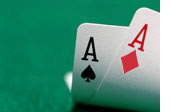
The best example of the greed effect in Texas hold ’em is when the first two cards you get are aces. While that’s the best possible opening hand, it is also maybe the single hand that causes the most losses.
Why? Seeing those “pocket rockets” sparks feelings of greed, and we start counting our chips before we’ve won the hand. The possibility of that big payout can blind us to thinking logically about our odds of winning -- just as people who play the lottery can let the possibility of a multi-million-dollar payout blind them to their ridiculously small odds of winning.
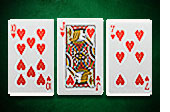
The tunnel vision greed causes can make us ignore even obvious signs that our powerful hand has actually turned into a loser. For example, suppose we’re holding the ace of diamonds and the ace of spades, and the first three community cards turned over (called the flop) are all hearts. Now a flush (someone who has five cards of the same suit) becomes a real possibility. But you keep betting, confident in your aces.
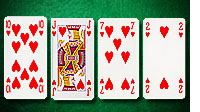
Then the next card is turned over, and it’s also a heart. The odds that one of your opponents has a heart to complete the flush are extremely high, so your aces have become virtually worthless. But you keep betting -- a mistake.
A pair of aces is the most obvious example, but the effect works with any hand you think is a sure winner and that causes you to ignore the possibility of loss. In poker, seldom do you hold a hand that’s a sure winner (called, in poker slang, the nuts).
In our portfolios, the same problem happens when we invest in something we think is a sure bet -- for instance, a stock with a great story that’s recently rocketed up in price. So confident are we that when negative information about the company is revealed -- the chief executive is indicted, say, or a key product is discovered to cause cancer -- we ignore it.
The way to stop the greed response is to focus not on the joys of winning, but on why you might not win. Test your hypothesis with each new card. “The story changes and you have to change with it,” says Frank Murtha, a behavioral-finance consultant. “That’s why great poker players will lay down great hands.”
In investing, Murtha says, greed leads us to get emotionally attached to an investment. A good way to shake this attachment -- basically the investing equivalent of testing your hypothesis with each new card -- is to ask yourself whether you would buy this stock at this price right now. “If the answer is no, not really, then we know that you have some sort of emotional need to hold on to it,” says Murtha.
More on Poker and Investing
How Texas Hold 'Em Simulates Investing
How Deepak Chopra Helped Me Become a Better Poker Player
Next page: OVERCONFIDENCE
[page break]
Overconfidence
Humans are overconfident animals. As Jason Zweig points out in his book Your Money & Your Brain ($15, Simon & Schuster), about 75% of people will judge themselves better than average at anything -- from driving to basketball to telling jokes to scoring well on an IQ test. Of course, half of any group, by definition, must be below average.
In poker, this plays out in, er, spades -- especially among beginners. The very act of playing a game such as Texas hold ’em is a humbling experience that will quickly deflate feelings of overconfidence. But the real value is helping you recognize situations in which overconfidence leads you into big losses.
Professional poker player Vanessa Rousso says this effect takes place particularly after large gains. “In tournaments when I’ve won a series of hands, it tends to make me loosen up and take excessive risks,” says Rousso, who holds a degree in economics from Duke University. “What could have been a period of prolonged success is quickly shortened by overconfidence.”
In investing, the parallel is obvious. During stock-market booms, many people start boosting their stakes in riskier investments, such as emerging-markets stocks. Or they may simply shift hefty percentages of their portfolios from bonds to stocks.
This overconfidence can turn into manias, such as the day-trading phenomenon of the late 1990s. Buoyed by the growing bubble in tech stocks, day traders felt they could sit at their computers and profit by quickly trading stocks. When the tech bubble burst, so did most of these traders’ fortunes.
Rousso says the key to combating overconfidence in poker is recognizing when you’re deviating from your game plan. That’s good advice for investors, too. When you’re tempted to take more risk, recognize the effects of overconfidence and methodically think through your plan.
More on Poker and Investing
How Texas Hold 'Em Simulates Investing
How Deepak Chopra Helped Me Become a Better Poker Player
Next page: REGRET
[page break]
Regret
Poker pro Daniel Negreanu says, “The toughest thing for a poker player to do is quit when he’s losing.” Losing a big hand in poker will often put a player “on tilt,” which means a player is so twisted up about losing that he’s apt to do crazy things. In investor psychology, that same feeling is known as regret.
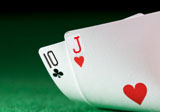
Imagine being dealt a ten and a jack, then watching as two sevens, an eight, a nine and an ace come up in the community cards on the table. You have a straight, and a single player has stayed in the hand, matching your bets chip for chip. Finally, you flip over your cards in triumph, and your opponent flips over his. He has a seven and an ace, a full house, and you realize that fat pile of chips belongs to someone else.
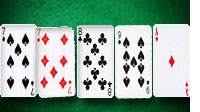
Oh, the pain. Literally. A financial loss stimulates the part of the brain associated with pain. A bad beat (poker slang for a tough break) often generates two responses: You bet big on a weak hand to try to make back the lost money, or you become so fearful of another loss that you play too conservatively.
The same thing happens in investing. A big loss causes regret, which can lead you to take big risks or to unload your securities and stay out of the market for an extended period. We saw both those things after the 2007-09 bear market, especially the tendency of investors to sit on the sidelines by holding only cash.
What’s at the core of regret? Behavioral-finance consultant Murtha says regret is such a powerful emotion because people hate to be responsible for their own pain.
When he counsels people who are frozen from regret, he urges them to take a long-term view and get back on the horse. “I know it’s hard to make this decision now, but if you want to accumulate this wealth over a lifetime you have to make the hard decisions now,” says Murtha. “You’ll look back someday and say, ‘Gee, why didn’t I have any guts?’ ”
Brown, the investment pro and poker player, says that learning to deal with losses at the card table can help investors deal with declines in their portfolios. If you made a mistake either playing a hand or picking a stock, learn from the mistake and resolve not to make it again.
But sometimes, Brown says, bad things just happen. He thinks of it this way: “Okay, I bought 20 stocks, and three turned out to be terrible. That’s okay; they were good at the time.”
More on Poker and Investing
How Texas Hold 'Em Simulates Investing
How Deepak Chopra Helped Me Become a Better Poker Player
Next page: SEEING PATTERNS
[page break]
Seeing patterns
One of my own poker demons is the “hot hand” fallacy. Humans are wired to see patterns where none really exist. A simple example of this is when fans think a basketball player who’s made a few consecutive shots will sink the next because of a hot hand. In fact, the next shot is no more likely to fall than the player’s longer-term shooting percentage would suggest.

Likewise, when playing poker there’s a tendency to think you can predict what cards will turn up next based on the cards already showing. If you’re holding a a ten and a jack, for example, and the flop includes a queen and a king, you may be tempted to bet big because the pattern is clear: Ten, jack, queen, king ... the next card is likely to be an ace. Right? In fact, the odds of ace coming up are only about one in 13.
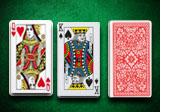
And if you’re trying to make a flush and you’re holding two hearts with two others on the table, the next card is likely to be a heart, right? Of course, hearts are only one of four suits, but your odds are even less than one-in-four. Four hearts are already accounted for, remember? So the deck holds only nine more.
Another reason why people see patterns may boil down to a feeling of hope. A poker player may want a card so badly that he or she disregards the low probability of getting that card. The hope and desire to hit the big hand (emotion) overwhelm better judgment (rationality). As the saying goes, hope is not a strategy.
This compulsion to see patterns hurts our investments in a number of ways. When it comes to stocks, a landmark study by professors Werner DeBondt, of DePaul, and Richard Thaler, of the University of Chicago, showed that investors relying on past information became overly optimistic about past stock-market winners and overly pessimistic about past losers. But the stock-price patterns didn’t persist. Over time, extreme winners underperformed the market, while extreme losers outperformed.
The hot hand works well with mutual funds, too. When it comes to mutual-fund advertising, the warning that “past performance is no indication of future returns” doesn’t seem to sink in with many of us. We see ads that promote two or three good years of returns, and we buy the funds -- even though that great performance is usually a random phenomenon, just like three consecutive “heads” on a tossed coin.
In poker, you can beat pattern thinking by calculating the odds. This kicks your thinking from instinctual and emotional to logical.
With investing, you likewise have to start thinking logically. First, look at the long term, especially with mutual funds. Check the five- and ten-year histories, not just how a fund has done the past couple of years.
And do some in-depth analysis. Look at things such as fees, turnover, fund size, manager tenure and so on. And with a stock, make sure a tempting record is based on solid fundamentals of the underlying company, not just investors piling into a stock simply because its price has been rising.
More on Poker and Investing
How Texas Hold 'Em Simulates Investing
How Deepak Chopra Helped Me Become a Better Poker Player
Next page: HOLDING LOSERS
[page break]
Holding losers
One of the best-known psychological errors in investing is the tendency to hold on to losing investments too long. Why can’t we sell?
It’s easier to see why if we look at this problem in poker terms. Say you’ve bet big on a hand that looked great at first, but started to look like a loser as more cards were turned over. In fact, your opponents could have straights, flushes and full houses, but you’re sitting with three-of-a-kind.
To stay in, you have to call one final, big bet. Murtha knows what’s going through your mind: “I know I shouldn’t call this. I know your hand is better. But I’ve got to see it. I’ve got to call!”
What happens when you fold a bad hand or sell an investment that’s gone south? You’re admitting that you made a bad decision, and that hurts your ego. True, the bad decision to hold and not to fold earlier is obvious without actually giving up. But folding a hand or selling a losing stock removes the last shred of possibility that you might have been right.
The solution to holding on to losers is to listen to that voice in your head saying, “I know I shouldn’t call this” or “I know I shouldn’t hold on to this investment.” That’s your logical self trying to drown out your ego.
You can also change your thinking so that your reward isn’t about making money, but about making a good decision. Let yourself feel good about doing something difficult, knowing -- as Daniel Negreanu says -- that you’re doing the hardest thing in poker, the thing that separates the greats from the rest of us.
We often let ourselves be rewarded for good outcomes rather than good decisions. That is a big mistake. Outcomes are often capricious and beyond our control. You can make bad choices and luck out, and you can make good choices and get burned. Successful poker players know that the key to accumulating wealth is relentlessly making the good decisions. If you do that long enough, you will make money in either game.
More on Poker and Investing
Profit and prosper with the best of Kiplinger's advice on investing, taxes, retirement, personal finance and much more. Delivered daily. Enter your email in the box and click Sign Me Up.

-
 Dow Adds 1,206 Points to Top 50,000: Stock Market Today
Dow Adds 1,206 Points to Top 50,000: Stock Market TodayThe S&P 500 and Nasdaq also had strong finishes to a volatile week, with beaten-down tech stocks outperforming.
-
 Ask the Tax Editor: Federal Income Tax Deductions
Ask the Tax Editor: Federal Income Tax DeductionsAsk the Editor In this week's Ask the Editor Q&A, Joy Taylor answers questions on federal income tax deductions
-
 States With No-Fault Car Insurance Laws (and How No-Fault Car Insurance Works)
States With No-Fault Car Insurance Laws (and How No-Fault Car Insurance Works)A breakdown of the confusing rules around no-fault car insurance in every state where it exists.
-
 Best Banks for High-Net-Worth Clients
Best Banks for High-Net-Worth Clientswealth management These banks welcome customers who keep high balances in deposit and investment accounts, showering them with fee breaks and access to financial-planning services.
-
 Stock Market Holidays in 2026: NYSE, NASDAQ and Wall Street Holidays
Stock Market Holidays in 2026: NYSE, NASDAQ and Wall Street HolidaysMarkets When are the stock market holidays? Here, we look at which days the NYSE, Nasdaq and bond markets are off in 2026.
-
 Stock Market Trading Hours: What Time Is the Stock Market Open Today?
Stock Market Trading Hours: What Time Is the Stock Market Open Today?Markets When does the market open? While the stock market has regular hours, trading doesn't necessarily stop when the major exchanges close.
-
 Bogleheads Stay the Course
Bogleheads Stay the CourseBears and market volatility don’t scare these die-hard Vanguard investors.
-
 The Current I-Bond Rate Is Mildly Attractive. Here's Why.
The Current I-Bond Rate Is Mildly Attractive. Here's Why.Investing for Income The current I-bond rate is active until April 2026 and presents an attractive value, if not as attractive as in the recent past.
-
 What Are I-Bonds? Inflation Made Them Popular. What Now?
What Are I-Bonds? Inflation Made Them Popular. What Now?savings bonds Inflation has made Series I savings bonds, known as I-bonds, enormously popular with risk-averse investors. How do they work?
-
 This New Sustainable ETF’s Pitch? Give Back Profits.
This New Sustainable ETF’s Pitch? Give Back Profits.investing Newday’s ETF partners with UNICEF and other groups.
-
 As the Market Falls, New Retirees Need a Plan
As the Market Falls, New Retirees Need a Planretirement If you’re in the early stages of your retirement, you’re likely in a rough spot watching your portfolio shrink. We have some strategies to make the best of things.
